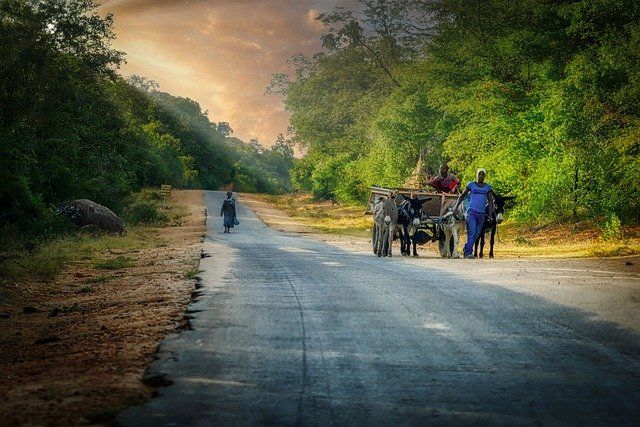True Christianity was first introduced to Zimbabwe in the nineteenth century through the ministry of Robert Moffat of the London Missionary Society.
Moffat first visited the Matabele people in 1829 and 1835, before they moved from South Africa into Zimbabwe.
He visited them again in 1854 and 1857, after they had settled in Zimbabwe. Then, in 1859, he was the leader of the mission group that set up a permanent base among the Matabele.
Obstacles
The labours of this group over the next thirty years saw only slight success, since the king of the Matabele was ‘resolutely opposed to his people accepting any of the tenets of the Christian religion’.
Protestant mission work among a neighbouring tribe, the Mashona (who were oppressed by the Matabele) was attempted in the 1870s by the Dutch Reformed Church. This failed — once more due to an unfavourable reception by the tribal leader, in this case the Shona chief.
The Matabele king had also refused permission for missionaries to work among the Mashonas. But in 1889 three native Reformed evangelists, Micha Maghato, Lukas Mokoele and Jozua Masoha, defied the Matabele chief and, at great risk to their own lives, began evangelising the Shona people.
In 1890 the Union Jack was raised over Mashonaland, thus allowing missionaries free access to this once forbidden area. And in 1891 the Church of England and Methodists began working there. Others followed soon after.
The Dutch Reformed mission base, Morgenster (now 111 years old) was established in 1891 by Rev. A. A. Louw.

Challenges
One of the biggest challenges missionaries faced in their confrontation with pagan culture was concerned with animism (spirit worship).
In animism, the spirits of dead ancestors are regarded as part of the worshipper’s clan, to be appeased and consulted on all important matters. Witchdoctors and fetishes are an integral part of the animist’s life — a life controlled by fear and envy.
These practices still dominate Zimbabweans today, so that many who profess the name of Christ continue to dabble in their cultural traditions. They refuse to make a clean break from them because they are afraid to anger dead ancestors and living relatives.
Many Christians compromise themselves because they are threatened with being cut off from their families, or even assaulted by family members, if they refuse to ‘respect’ their ancestors.
As a result, syncretism plagues the churches — so much so, that some pastors will not preach against ancestral veneration for fear of offending their congregations.
Born-again believers
Recent statistics claim that more than 70% of Zimbabweans profess Christianity. However, determining the percentage of truly born-again believers is difficult.
There is no doubt that Christianity has had a great impact upon Zimbabwe and continues to be influential, and for this we give God glory and thanks.
However, if one were to ask how many churchgoers understand the doctrines of grace and God’s sovereignty in salvation, the answer would be a very small percentage of them indeed.
Although these particular doctrines are the starting place for real, God-glorifying reformation, they are ignored or denied in many churches.
While there is great zeal shown by the Christians, it is not always according to knowledge (Romans 10:2). And when God’s revelation is not the final authority for every aspect of life and belief, real spiritual fruit is lacking (Proverbs 29:18).
Reformed literature

Because of this theological vacuum, there is a great need for Reformed literature in Zimbabwe.
Due to the weakness of the Zimbabwean currency, imported literature is expensive for the average Zimbabwean, and so locally produced literature is vital.
Christian Audio Visual Action, an evangelical mission organisation, is doing good work in publishing booklets in a number of languages, dealing with issues like witchcraft and personal moral concerns.
Yet, there is still a woeful lack of Bible commentaries and other theological books in the local languages.
Shona is spoken by some 70% of the people in Zimbabwe and this writer knows of only two Bible commentaries in the Shona language — translations of his own commentaries on John and Acts.
Unless there is an increase in the availability and affordability of Reformed theological literature (in the major languages), the church in Zimbabwe will continue to be described, like many other African churches, as a river that is a mile wide but only an inch deep.
In the meantime, Trans World Radio helps to meet the great need for biblical instruction, broadcasting into Zimbabwe from Swaziland in four different languages. Nevertheless, radio and television are still greatly under-utilised as media for reaching people with biblical truth.
Social problems
The church has been unsure in its response to gross political corruption, and so has remained largely silent in the face of social wickedness. Political polarisation has infected it, even to the degree that some churchgoers have been involved in violence against members of their own congregations supporting different political parties.
The AIDS pandemic in Zimbabwe (where a person, usually a young adult, dies every two minutes) is proving to be a severe test. There are now close to a million AIDS orphans.
Extended families have courageously been trying to bear this burden, but also carry the ever-increasing burden of unemployment in a collapsing economy (unemployment is above 60% and inflation over 100%).
Add to this the famine conditions now threatening at least half the population, and it is clear that both society in general and the church are facing a potential catastrophe of monumental proportions.

Ungodly leaders
Another area of deep concern has arisen because the ruling political party, with its destruction of the economy and disregard for human rights and the rule of law, now finds itself bankrupt and cut off from Western economic aid.
Zimbabwe’s leaders have turned to Libya for economic aid, and Libya, in turn, has been quick to exploit the crisis and promote an Islamic agenda in Zimbabwe, ‘evangelising’ the impoverished with piles of money.
However, by God’s grace, there is a growing awareness of this danger in churches. Church leaders are responding by equipping their congregations to evangelise Muslims and defend Christians against such deception.
Confidence
Despite the difficulties and challenges that face Christ’s true Church, this writer is confident, for he knows him who is from everlasting and Lord of both heaven above and the earth beneath.
Nothing will be able to thwart the advance and establishment of Christ’s eternal Kingdom (Matthew 16:18). To him be all glory, praise and honour!








